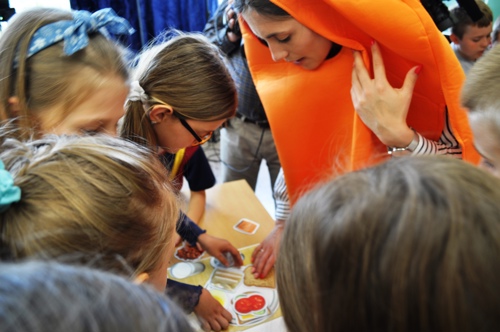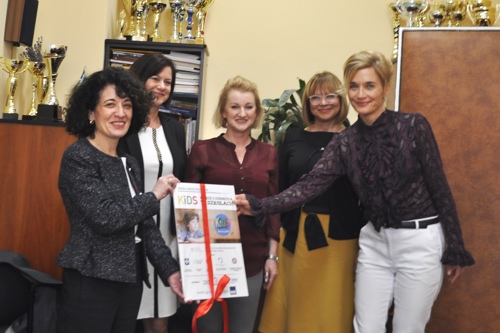Diabetes partnership powering a healthier future
14.02.19
KiDS and Diabetes in Schools won the Prevention & Awareness Category at the Health Collaboration Awards
Europe is on the frontline of the global diabetes epidemic. Not only does the European region have the highest number of children and adolescents with type 1 diabetes, its rising rates of obesity threaten to trigger a tsunami of type 2 diabetes.
Europe is on the frontline of the global diabetes epidemic. Not only does the European region have the highest number of children and adolescents with type 1 diabetes, its rising rates of obesity threaten to trigger a tsunami of type 2 diabetes.
Worldwide obesity has nearly tripled since 1975, with hundreds of millions of children overweight or obese. Around one in five people in Europe is an unhealthy weight, putting them at increased risk of diabetes.
Poland is a case in point. More than 20% of primary and secondary school children in Poland are overweight. The numbers have been rising fast, prompting the government to prioritise action to contain the health and economic costs.
In the Podkarpacie region of Poland, more than half of local inhabitants are overweight. At a health debate in the region in 2017, supported by Sanofi and the University of Rzeszów, experts highlighted diabetes prevention as an area for urgent action. Sanofi has had a manufacturing plant in Rzeszów for more than 30 years and is committed to playing an active role in solving the defusing the diabetes timebomb in collaboration with others.
Informed lifestyle choices
The KiDS and Diabetes in Schools, an educational programme, was co-created by the International Diabetes Federation (IDF), the International Society for Pediatric and Adolescent Diabetes (ISPAD) and Sanofi. The goal was to make schools a safe and supportive environment for children with diabetes, to fight discrimination, and to prevent type 2 diabetes through education on lifestyle choices.


The initiative targeted children aged 6-14, their parents, teachers and other school staff. It provided easy-to-read comic booklets and interactive learning materials for each target group. This carefully developed material aimed to help children with diabetes type 1 to manage their condition in school without discrimination, and to raise awareness of among all students of the benefits of healthy diets and physical activity.
‘Establishing healthy habits early on is vital to support the health and well-being of young children and encourages the adoption of a healthy lifestyle into adulthood, said Prof Nam Cho, President of the International Diabetes Federation. ‘The KiDS project stresses the importance of diabetes education from an early age.’
Poland was the first country to introduce the global KiDS project in Europe. It could become a role model for others.
250 medical students from the Medical Faculty of the University of Rzeszów were taught how to bring their knowledge to children and educators using tailor-made teaching resources. Training was performed in 15 schools, reaching 1,373 children and their 40 teachers.
Win-win
The collaboration was a big hit, attracting the endorsement of the Minister of Education, the Rzeszów City Major, the Podkarpacie School Inspector, the Podkarpackie Region Sanitary Inspector, the University of Rzeszow, the Polish Diabetes Association and the Polish Federation on Education in Diabetology. The innovative partnership was a win-win for students – who gained valuable experience – and the wider community.
‘Collaboration was vital to making the KiDS project a success,’ said Prof Cho. ‘Bringing together international non-profit organisations, industry partners, local diabetes associations and educational institutions has helped deliver a project that can make a real difference.’
Magdalena Kruszewska, Chairwoman of Sanofi Poland, said the project was highly innovative as it addressed a broad range of groups, including teachers and school staff, equipping them with information and practical knowledge on diabetes care.
‘School is the place where social attitudes are acquired, behaviour is shaped, and lifestyle habits affecting health are formed,’ Magdalena Kruszewska said. ‘Types 1 and 2 diabetes are a growing global problem, and children are no exception. Therefore, education raising awareness and introduction of preventive measures should start as early as possible and the school is the natural place to learn.’
The initiative has been presented at a number of conferences, prompting strong interest in rolling it out in other cities. Education officials are exploring how the programme can be expanded to other regions of Poland, while Hungary initiated the project in 2018. Talks are under way with the Podlasie region in Poland where 46% of the population is overweight. Sanofi has offered to transfer knowledge and learning tools to governments or patient organisations interested in bringing KiDS to new schools.


‘We are ready to share our know-how and materials developed by IDF,’ said Magdalena Kruszewska. ‘We hope that this important initiative will help children across Poland and will lead to persistent systemic changes that improve the lives of kids suffering from diabetes type 1 and prevent diabetes in the wider society.’